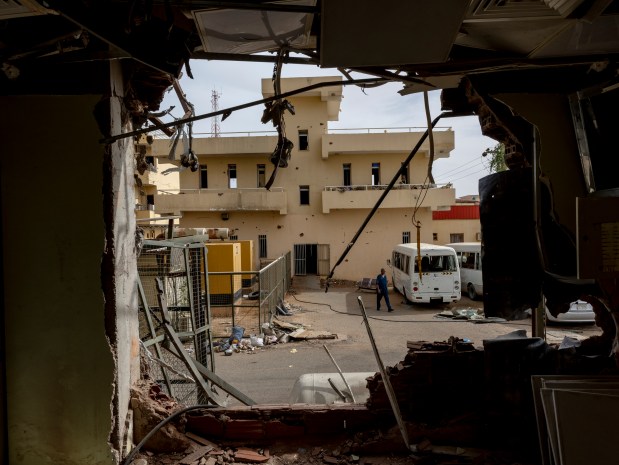The United States just launched a new effort to end Sudan’s civil war, inviting the two warring sides to Switzerland to engage in talks aimed at a cease-fire. Switzerland and Saudi Arabia are co-hosting the effort in mid-August, with the African Union, Egypt, the United Arab Emirates and the United Nations as observers.
I’m skeptical that the two men leading this war are interested in resolving their differences off the battlefield. Gen. Abdel-Fattah Burhan, head of the Sudanese Armed Forces, or SAF, and the de facto head of state, has yet to agree to join the talks. Gen. Mohammed Hamdan Dagalo, known as Hemedti, who leads the paramilitary Rapid Support Forces, or RSF, has announced plans to attend, but he currently has the upper hand in the war, which he hopes will force concessions.
These two men have already tried sharing power, and it suited neither of them.
In 2019, Burhan and Hemedti joined forces to oust long-standing dictator Omar al-Bashir in a coup. The coup occurred after months of popular protests demanding democracy and civilian rule, and Bashir’s ouster was widely welcomed. But they had no intention of handing the reins over to a civilian government. They merely used demands for democracy as a smokescreen to seize power for themselves and eventually turned on each other.
But that doesn’t mean that attempts at peace talks are futile. Negotiating an end to conflict takes time and effort. Progress can be incremental, and opportunities to relieve human suffering should be seized, even if temporary.
The bigger opportunity, however, might not be in trying to persuade obstinate generals, but rather in convincing those who make their war possible to join the side for peace instead.
The stakes of this war are immense. Sudan is on the verge of becoming a failed state, and its population of nearly 50 million people is at great risk. More than 10 million Sudanese — 20% of the country’s population — have been forced from their homes, creating the world’s largest displacement crisis. Nearly 26 million people face crisis levels of hunger, and the threat of famine looms.
Human suffering is rampant now and could escalate. Both sides face allegations of widespread war crimes. The RSF has already been accused of genocide in Darfur — a credible allegation since the RSF is essentially the rebranded Janjaweed militia that committed genocide there in the early 2000s.
The RSF has seized control of much of the capital city Khartoum, western Sudan and the country’s agricultural heartland. This has pushed Burhan to relocate what remains of government operations over 500 miles east to Port Sudan.
Sudan’s war threatens its neighbors, most of whom face severe instability already — Libya, Chad, Central African Republic, South Sudan, Ethiopia, Eritrea and Egypt all share its borders. A flood of refugees, the increasingly permissive environment for transnational crime and trafficking, and Sudan’s strategic location on the Red Sea, one of the world’s most vital waterways for trade, pose national security concerns for countries much farther afield. The country is also home to abundant lootable resources, most notably gold, which is valuable and easy to transport.
All of these reasons have led countries such as the United States and Sudan’s neighbors to press for peace. But other countries see these factors as reasons to meddle and vie for influence. The UAE has been particularly consequential in providing weapons and other material support to the RSF, without which this war would likely be over by now, or at least contained to a small insurgency in the RSF’s stronghold in the west. Countries such as Egypt and Saudi Arabia have provided some support to the SAF, though it has been more political than material assistance for the fight. That could change as the RSF threatens to balkanize the state.
Discontented with insufficient Arab support, the SAF has recently looked to Iran to meet its needs. Following an eight-year rupture, Burhan just fully restored diplomatic ties with Tehran and in return has received attack drones and other weapons. This could propel states such as Saudi Arabia to step up their support to prevent Iran from securing more influence in the region.
These are just some of the outside players that keep this war moving. But therein lies the key to ending it, too. Some of the most essential supporters of this war are also parties to the planned peace talks. Though they are labeled “observers,” the positions they take could be the difference between success and failure. Wars are expensive. If Middle Eastern powers, particularly the UAE, can be persuaded to prioritize peace instead of war, the warring parties would find it very hard to continue fighting.
The United States would be wise to direct its persuasion to these actors, with whom they have close relationships and, presumably, more influence. The generals have little reason now to give up the fight, but if their benefactors press them to, they might have little choice. That could make for far more productive peace talks next month.
Elizabeth Shackelford is senior policy director at Dartmouth College’s Dickey Center for International Understanding and a foreign affairs columnist for the Chicago Tribune. She was previously a U.S. diplomat and is the author of “The Dissent Channel: American Diplomacy in a Dishonest Age.”
Submit a letter, of no more than 400 words, to the editor here or email letters@chicagotribune.com.



